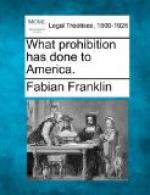Any resort whatever to alcoholic drinks being held
by so large a proportion of the persons who are most
influential in religious and educational circles to
be sinful and incompatible with the best character,
it is almost inevitable that, in thousands of cases,
desires and needs which would find their natural satisfaction
in temperate and social drinking are turned into the
secret and infinitely more unwholesome channel of
drug addiction. How much of the extraordinary
extent of this evil in America may be due to this cause,
I shall of course not venture to estimate; but that
it is a large part of the explanation, I feel fairly
certain. And my belief that it is so is greatly
strengthened by the familiar fact that in the countries
in which wine is cheap and abundant, and is freely
used by all the people, drunkenness is very rare in
comparison with other countries. As easy and
familiar recourse to wine prevents resort to stronger
drinks, so it seems highly probable that the practice
of temperate drinking would in thousands of cases
obviate the craving for drugs. But when all drinking,
temperate and intemperate, is alike put under the
ban, the temptation to secret indulgence in drugs gets
a foothold; and that temptation once yielded to, the
downward path is swiftly trodden. Finally, there
is a broad view of the whole subject of the relation
of Prohibition to life, which these last reflections
may serve to suggest. When a given evil in human
life presents itself to our consideration, it is a
natural and a praiseworthy impulse to seek to effect
its removal. To that impulse is owing the long
train of beneficent reforms which form so gratifying
a feature of the story of the past century and more.
But that story would have been very different if the
reformer had in every instance undertaken to extirpate
whatever he found wrong or noxious. To strike
with crusading frenzy at what you have worked yourself
up into believing is wholly an accursed thing is a
tempting short cut, but is fraught with the possibility
of all manner of harm. In the case of Prohibition,
I have endeavored to point out several of the forms
of harm which it carries with it. But in addition
to those that can so plainly be pointed out, there
is a broader if less definite one.
When we have choked off a particular avenue of satisfaction
to a widespread human desire; when, foiled perhaps
in one direction, we attack with equal fury the possibility
of escape in another and another; who shall assure
us that, debarred of satisfaction in old and tried
ways, the same desires will not find vent in far more
injurious indulgences ? How different if, instead
of crude and wholesale compulsion, resort were had—as
it had been had before the Prohibitionist mania swept
us off our feet—to well-considered measures
of regulation and restriction, and to the legitimate
influences of persuasion and example! The process
is slower, to be sure, but it had accomplished wonderful
improvement in our own time and before; what it gained
was solid gain; and it did not invite either the resentment,
the lawlessness, or the other evils which despotic
prohibition of innocent pleasure carries in its train.




